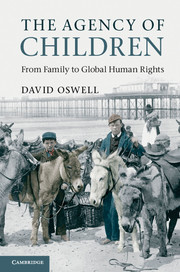2 - Agency after Ariès: sentiments, natures and spaces
Published online by Cambridge University Press: 05 April 2013
Summary
In this chapter I return to a seminal work in the sociology of childhood, written by the historian Philippe Ariès over fifty years ago. The book, Centuries of Childhood (1962), was originally published in French as L’Enfant et la vie familiale sous l’Ancien Régime (1960). It offered a history of childhood, but also, perhaps more importantly, it provided a way of understanding and perceiving children not only as actual children in the ‘here and now’, nor even childhood as an image, but as children whose very distinctiveness as children is a consequence of their history. What Ariès gives us is a sense of children as imbued with a historicity. Children are seen as having an historical particularity, as constituting not only a social or psychological, but an historical subjectivity. For the question Ariès asks, ‘How did we come from that ignorance of childhood to the centring of the family around the child in the nineteenth century?’ (Ariès, 1962: 8), is one which is not only about the status of an idea (despite what Ariès insists), but also one which changes our relationality with and as children. It is only with the work of Ariès and others in the 1960s that this particularity is able to be understood qua historical particularity: namely, as an aspect of historical self-reflection and reflexivity. But also this sense that children have an historical existence implies that the experiences and agencies of children are disclosed within a horizon of historical reflection.
Nevertheless, the sociology of childhood has really only been concerned with three aspects of Ariès’ argument: namely, that childhood is an historical invention; that childhood is thus a social institution (not a biological given); and that childhood constitutes a form of division and segregation between children and adults. In the proceeding sections I follow Ariès obliquely in order to provide brief genealogies of three main thematics which undergird much of this book. In doing so, I am sympathetic to, but also highly critical of (a standard sociological reading of) Ariès’ argument inasmuch as I argue that children are not reducible to categorical forms of conceptualisation; children as a collectivity are not reducible to a social invention; and children as modern collective subjects are not reducible to their enclosure within purified ‘child only’ spaces. These three reductions, I argue, have been highly significant in delimiting questions about children’s agency within the sociology of childhood.
- Type
- Chapter
- Information
- The Agency of ChildrenFrom Family to Global Human Rights, pp. 9 - 34Publisher: Cambridge University PressPrint publication year: 2012



